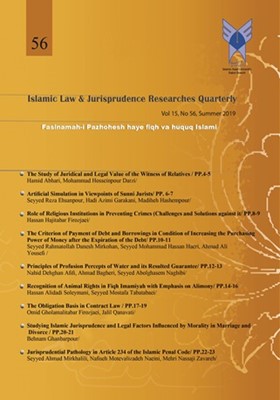Artificial Simulation in Viewpoints of Sunni Jurists
Subject Areas : Private lawSeyed Reza Ehsanpour 1 , Hadi Garakani 2 , Madiheh Hashempour 3
1 - Assistant Professor in Law, Shahed University, Tehran, Iran
2 - Assistant Professor in Islamic Law & Jurisprudence, Assistant Professor, Central Tehran Branch, Tehran, Iran
3 - دانشجوی دکتری فقه و مبانی حقوق اسلامی، واحد تهران مرکزی، دانشگاه آزاد اسلامی، تهران، ایران
Keywords: Permission, Artificial simulation, Forbiddance, Sunni Jurists,
Abstract :
Sunni jurists have different views about the artificial simulation. Permission or forbiddance of simulation depends on its type: IUI or IVF. Most of the jurists who oppose IUI believe that it is against the Quran verses and Sunna of Holly Prophet and results in disturbing the lineage. In addition, IUI surgery pre-requirements are ejaculation by sperm donor and touching body of women by physician to simulate, which both of them are forbidden. On the other side, those jurists who are in believe of artificial simulation surgeries answers: there are no clear and explicit Islamic verses, which ban this kind of surgery, it never results in lineage disturbance and ejaculating for obtaining sperm from husbands by their wives will solve the forbiddance (Hurmat). In addition, there is a juridical rule saying: Necessities makes bans and forbiddance permitted. Arguments about simulating by sperm of dead or divorced husband are more controversial. In sum, most of the Sunni jurists believe that artificial simulation is permitted only if done in waiting time of death and divorce. These arguments are also true about IVF but some jurists depended it on some conditions including ensuring the right of the fetus life.
_||_
Al-Bar, M. (1986). Al-Talqih Sanaei va Atfal Anabib. Mecca: Majma Fiqh Islamiyah.
Al-Dasoughi, M. (No date). Hashiah Dasoughi. Beirut: Darol Fekr.
Al-Kasani, A. (1982). Badaye Sanaeh. Beirut: Darol Ketab Arabi.
Al-Saboni, M. (1992). Safvah Tafasir. Damascus: Maktabah Ghazali.
Al-Seyvasi, K. (No date). Fathol Qadir fi Sharh Hedayah. Beirut: Darol Kotob Fkekr.
Al-Seyvati, A. R. (1983). Al-Ashbah Va Al-Nazaer. Beirut: Drol Kotob Elmiyeh.
Al-Sharif, M. (1986). Al-Monaqeshe. Mecca: Majma Fiqh Islamiyah.
Al-Sherbini, M. (No date). Mani Mohtaj.Beirut: Darol Fekr.
Al-Tamimi, R. (1986). Al-Monaqeshse. Mecca: Majma Fekr Islami.
Bokhari, M.E. (1987). Sahih Al-Bokhari. Beirut: Dar Ibn Kasir.
Daremi, A. M. (1987). Sonan Al-Daremi. Beirut: Darol Ketab Arabi.
Hamdol Khalili, A. (1986). Al-Monaqeshse. Mecca: Majma Fekr Islami.
Harmoosh, M. A. (1994). Ghayat Mamol fi Tozi Forou Lel. Lebanon: Maktabah Bohoos Saqafiyah.
Ibn Qodameh, A. (1985). Al-Moqni. Beirut: Darolfekr.
Mahmoud, M. (2007). Ejarah Arham Bayn Teb Val Shariah Islamiyah. Beirut: Darol Kotob Elmiyah.
Zarqa, M. (1986). Al-Monaqesheh. Mecca: Majma Fiqh Islami.
Zoheyli, V. (1989). Al-Fiqh Islami Va Adeleh. Damascus: Darol Fekr.


